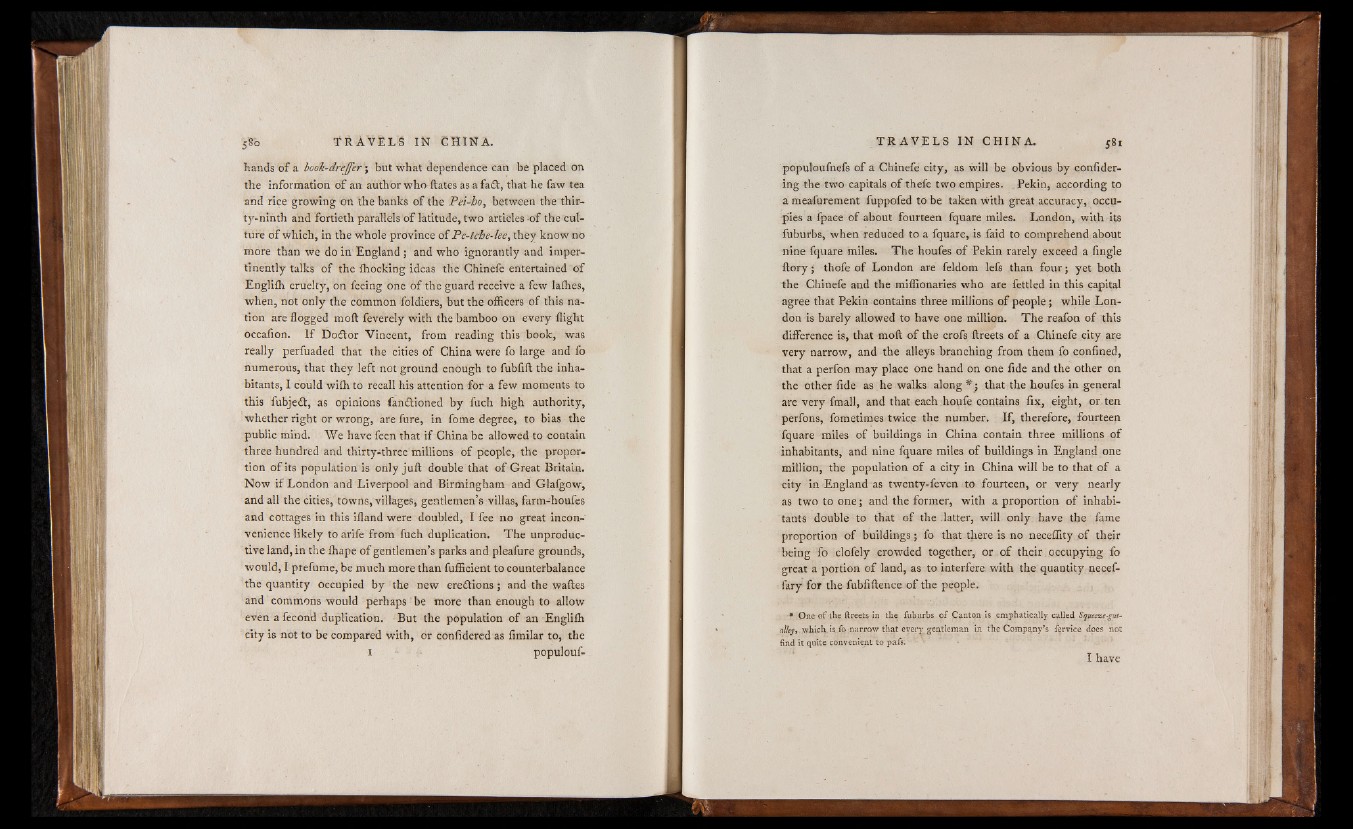
hands o f a book-drejjer; but what dependence can be placed on
the information o f an author who ftates as a fa il, that he faw tea
and rice growing on the banks o f the Pei-ho, between the thirty
ninth and fortieth parallels o f latitude, two articles o f the culture
o f which, in the whole province o f Pe-tche-lee, they know no
more than we do in England ; and who ignorantly and impertinently
talks o f the ihocking ideas the Chinefe entertained o f
Englifh cruelty, on feeing one o f the guard receive a few lafhes,
when, not only the common foldiers, but the officers o f this nation
are flogged molt feverely with the bamboo on every flight
occafion. I f Doftor Vincent, from reading this book, was
really perfuaded that the cities o f China were fo large and fo
numerous, that they left not ground enough to fubfift the inhabitants,
I could wiffi to recall his attention for a few moments to
this fubjeit, as opinions fanftioned by fuch high authority,
whether right or wrong, are fure, in fome degree, to bias the
public mind. W e have feen that if China be allowed to contain
three hundred and thirty-three millions o f people, the proportion
o f its population is only juft double that o f Great Britain.
Now if London and Liverpool and Birmingham and Glafgow,
and all the cities, towns, villages, gentlemen’s villas, farm-houfes
and cottages in this ifland were doubled, I fee no great inconvenience
likely to arife from fuch duplication. The unproductive
land, in the ffiape o f gentlemen’s parks and pleafure grounds,
would, I prefume, be much more than fufficient to counterbalance
the quantity occupied by the new ereftions ; and the waftes
and commons would perhaps be more than enough to allow
even a fecond duplication. But the population o f an Englifh
city is not to be compared with, or confidered as fimilar to, the
i populoufpopuloufnefs
o f a Chinefe city, as will be obvious by confider-
ing the two capitals o f thefe two empires. . Pekin, according to
a meafurement fuppofed to be taken with great accuracy, occupies
a fpace o f about fourteen fquare miles. London, with its
fuburbs, when reduced to a fquare, is faid to comprehend about
nine fquare miles. The houfes o f Pekin rarely exceed a fingle
fto r y ; thofe o f London are feldom lefs than fo u r ; yet both
the Chinefe and the miffionaries who are fettled in this capital
agree that Pekin contains three millions o f p eople; while London
is barely allowed to have one million. The reafon o f this
difference is, that moil o f the crofs ftreets o f a Chinefe city are
very narrow, and the alleys branching from them fo confined,
that a perfon may place one hand on one fide and the other on
the other fide as he walks along * ; that the houfes in general
are very fmall, and that each houfe contains fix, eight, or ten
perfons, fometimes twice the number. If, therefore, fourteen
fquare miles o f buildings in China contain three millions o f
inhabitants, and nine fquare miles o f buildings in England one
million, the population o f a city in China will be to that o f a
city in England as twenty-feven to fourteen, or very nearly
as two to one; and the former, with a proportion o f inhabitants
double to that o f the latter, will only have the fame
proportion o f buildings; fo that there is no neceffity o f their
being fo clofely crowded together, or o f their occupying fo
great a portion o f land, as to interfere with the quantity necef-
fary for the fubfiftence o f the people.
* One of the ftreets-in tlie fuburbs of Canton is emphatically called Squeeze-gut-
alley, which is.ft? narrow that eyerv gentleman in the Company’s fervice does not
find it quite convenient to pafs; P
I have